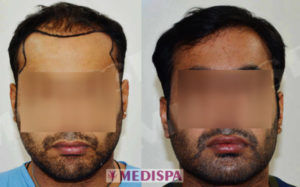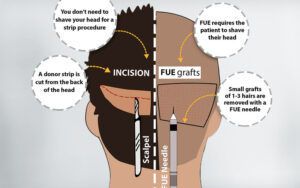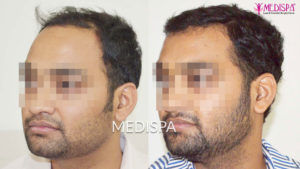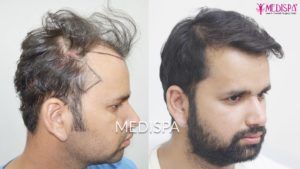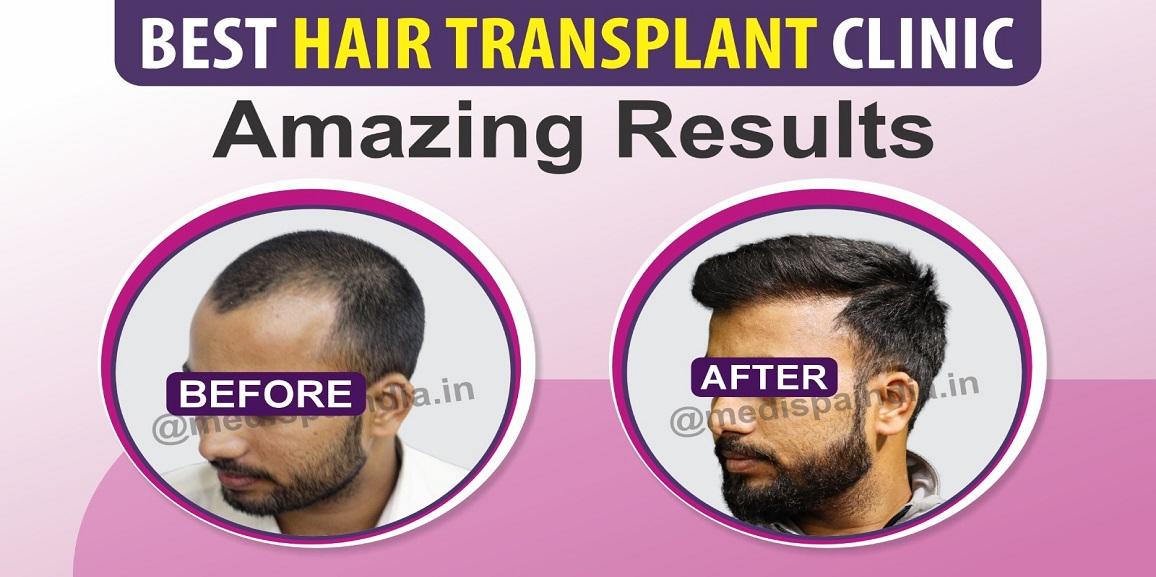
Hair transplant in India has become increasingly popular. People from all corners of the globe are drawn to the popularity of hair transplant tourism in India. The ease of internet access has made it simple to communicate with Indian clinics and receive top-notch hair treatment. The hair transplant cost in India is significantly lower, around 5-6 times less than in other countries. Some hair transplant clinics in India are known for their unmatched quality. Only a select few hair transplant clinics in India have gained international recognition for their expertise. Among these, Medispa hair transplant clinic stands out as one of the most renowned in the world. We offer world-class hair transplantation services at an affordable rate, maintaining global standards and utilizing the latest techniques. Our team of professionals carefully assess the cause of hair loss and recommend the most suitable treatment plan for each individual. We are committed to providing exceptional results and ensuring a safe, complication-free experience by strictly following all hygiene protocols. With a track record of assisting over 20000 individuals from more than 20 countries, we are constantly striving to enhance our services based on our patients’ satisfaction. For those in search of the premier hair transplant clinic in India, Medispa hair clinic is the perfect destination to turn your hair restoration goals into reality.
The process of carrying out a hair transplant involves outpatient surgical procedures that aim to cover bald areas on the scalp or in facial regions such as the beard, mustache, and eyebrows. It can also be chosen to reshape the hairline if the current one is unsatisfactory.
During the procedure, hair grafts are harvested from donor areas of the body that have permanent hair roots and then transplanted to the desired bald area. The duration of the procedure varies, typically taking 4-8 hours depending on the technique used. Hair transplant offers a long-term solution for hair loss, providing permanent and natural-looking results. However, it is important to note that this procedure is suitable only for individuals with a dense donor area capable of providing enough hair grafts for successful outcomes.
The entire process of hair transplantation includes the following steps:
- Application of local anesthesia to both the donor and the bald area where the hair will be transplanted.
- Extraction of hair grafts from the appropriate donor area using the appropriate technique.
- Preparation of slits at the transplantation site.
- Transplantation of the hair follicular grafts.
- Provision of post-operative counseling and follow-ups.
Planning to go for hair transplant: What you should know beforehand?
- Research reputable hair transplant clinics: It is essential to choose a reputable and experienced hair transplant clinic for your procedure. Take the time to research different clinics, read reviews, and compare their qualifications and success rates. This will help ensure that you receive the best possible care and achieve the desired results.
- Understand the potential risks and complications: Like any surgical procedure, hair transplant carries certain risks and potential complications. It is important to be aware of these risks and discuss them with your doctor. Understanding the potential side effects and complications will help you make an informed decision and prepare for any possible outcomes.
- Consider the cost and financial implications: Hair transplant procedures can be costly, and it is important to consider the financial implications before making a decision. Research the average cost of the procedure, inquire about payment options and insurance coverage, and determine if it fits within your budget. It is also worth considering the long-term maintenance costs associated with the procedure.
- Have realistic expectations: It is crucial to have realistic expectations about the outcome of a hair transplant. While the procedure can provide significant improvement in hair density and appearance, it may not completely restore your hair to its original state. Discuss your expectations with your doctor and understand the limitations of the procedure.
- Prepare for the recovery period: Hair transplant procedures require a recovery period, during which you may experience some discomfort and temporary side effects. It is important to follow your doctor’s post-operative instructions, take any prescribed medications, and allow yourself enough time to heal. Understanding and preparing for the recovery period will help ensure a smooth and successful healing process.
- Seek support and guidance: Undergoing a hair transplant can be a significant decision, and it is important to seek support and guidance from your loved ones. Discuss your concerns and expectations with them, and consider joining support groups or online forums where you can connect with others who have undergone similar procedures. This can provide valuable emotional support and help you navigate the process more effectively.
Remember, undergoing a hair transplant is a personal decision, and it is important to gather all the necessary information and consider these key points before making a final decision. By doing so, you can increase the chances of a successful procedure and achieve the desired results.

